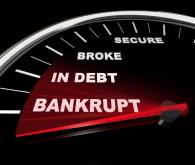Every year, federal bankruptcy protections aid thousands of Americans in obtaining a financial fresh start. If you are considering filing for bankruptcy as an individual consumer (as opposed to a corporation or business entity), you have two options: Chapter 7 bankruptcy, or Chapter 13 bankruptcy. Your ability to file either one of these cases depends on your income, assets, debts.
A Chapter 7 is the simplest form of bankruptcy. This type of case is designed to wipe-out most of your unsecured debt. Unsecured debt includes obligations such as medical bills, credit card payments, and other accounts that are not secured by a loan. In contrast, a mortgage on a house or a vehicle loan on a car makes these types of debts secured. A Chapter 7 bankruptcy cannot wipe-out most secured debts.
In order to qualify for a Chapter 7 bankruptcy, you must have little or no disposable income and very few assets. Chapter 7 debtors are only allowed to keep a certain amount of property which is known as exempt property. Often, Chapter 7 bankruptcy exemptions only protect $2,000-$3,000 worth of assets. Any property that is not covered by an exemption may be sold by the bankruptcy to pay your debts.
Once the paperwork for a Chapter 7 case is completed, you will have to attend a meeting of the creditors, known as a “341 meeting.” Here, you and your attorney will meet your trustee who is responsible for administering your bankruptcy plan. Sometimes, creditors will attend this meeting if they have an objection to your bankruptcy plan. However, this is uncommon and usually only happens when a debtor is accused or suspected of fraud.
If your Chapter 7 case is approved following your 341 meetings, there will be a 90-day waiting period to allow any other creditors to file a claim or an objection to your case. Absent any objections, you will receive a bankruptcy discharge and you will no longer owe any of the debts listed in the Chapter 7 case.

Due to the varying types of bankruptcy options available to you and the fact that federal courts strictly enforce the bankruptcy rules, you need the help of an experienced debtor rights attorney—like those at Fitzgerald & Campbell—if you are considering filing for bankruptcy or have already done so. Our attorneys have decades of experience representing clients in bankruptcy and all other types of debtor defense cases, and we are here to help you!
Call us today for a free consultation at (844) 431-3851, or email us at info@debtorprotectors.com.

